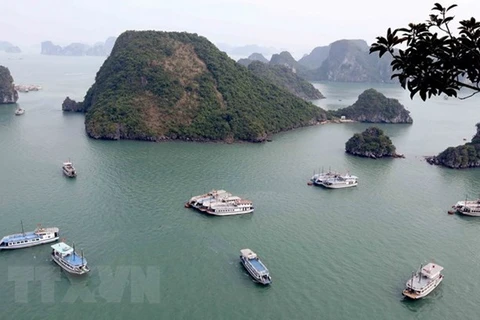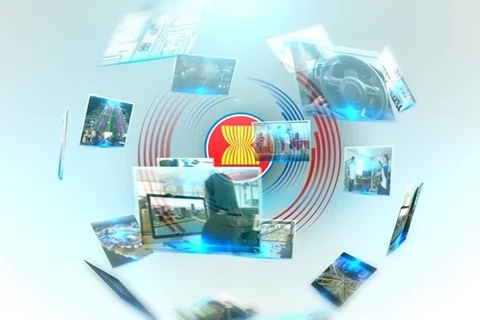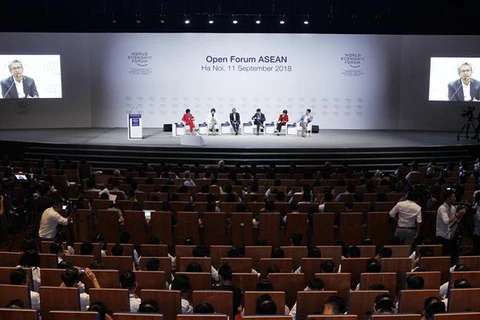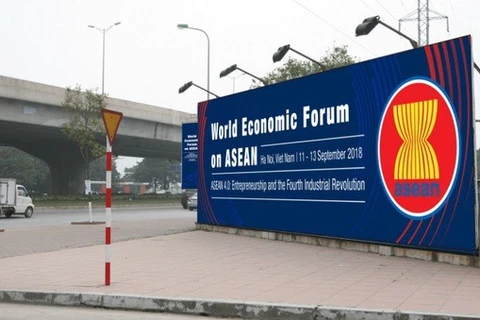 Klaus Schwab, Founder and Executive Chairman of World Economic Forum delivers a speech at Open Forum (Photo: Lam Khanh/VNA)
Klaus Schwab, Founder and Executive Chairman of World Economic Forum delivers a speech at Open Forum (Photo: Lam Khanh/VNA) Hanoi (VNA) - Hundreds of people, mostly young startup leaders and students joined an open forum on how start-ups can drive new opportunities in the fourth Industrial Revolution (4IR) in Hanoi on September 11.
The forum, themed ASEAN4.0 for All, was developed to give students, entrepreneurs, young professionals and the general public an opportunity to discuss what their future might look like as technological disruption shapes the ASEAN region.
Klaus Schwab, Founder and Executive Chairman of the World Economic Forum stress the changes the 4IR - with new technologies such as artificial intelligence, internet of things, thrones - will make in various aspects, from economies to society.
“The 4IR will not just change how we produce, consume and communicate. It will change who we are,” Schwab said.
He urged young people to be aware of the happening and the impact of 4IR as well as being prepared for it as the revolution will destroy many chances while creating new opportunities.
“We have to make sure that we have new skills to adapt to those required in new age,” Schwab said.
In his opening speech, Minister of Science and Technology Chu Ngoc Anh suggested ASEAN nations, including Vietnam, develop visions and strategies in the context of 4IR to make ASEAN an innovation hub.
“It is the fastest and most effective way to identify opportunities and challenges in the context of 4IR, thus helping young ASEAN people to turn challenges into opportunities, ideas into products and gain more successes in startup and innovation,” Anh said.
The Government of Vietnam considers enterprises and startups as the central force of the national economy and science and technology as the driving force of a sustainable development economy.
Vietnam has developed a national startup ecosystem and action plans to tap potential and adapt to challenges in the 4IR.
The country is also developing the national strategy for science, technology and innovation vision 2035 and the scenario of 4IR for Vietnam.
Vietnam is willing to cooperate with WEF and ASEAN nations, local and international resources for science-technology and innovation, Anh said.
 Minister of Science and Technology Chu Ngoc Anh (second left) takes selfie with delegates after attending Open Forum (Photo: Lam Khanh/VNA)
Minister of Science and Technology Chu Ngoc Anh (second left) takes selfie with delegates after attending Open Forum (Photo: Lam Khanh/VNA)
The forum saw a panel discussion with participation of regional government officials, entrepreneurs and chief executive officers of multinational companies.
The panel touched regional issues and opportunities emerged in the 4IR, such as employment, education, ecommerce and e-marketing, among others.
The Vietnamese panel participant, Le Hong Minh, Chief Executive Officer of the VNG Technology Corporation, told participants his business story, which made his startup one of the most successful company in Vietnam and among the most creative startups in the world.
“If you find excitement in anything, which others think is impossible, go for it because it will become reality in 20 years from now,” Minh said, adding he did the same when starting his business in 2004.
Minh also called on young people to think out of the box to find opportunities for themselves in the 4IR, saying “If you start your business in a conventional way, thousands of others are doing it.”
Syed Saddiq Abdul Rahman, Minister of Youth and Sports of Malaysia, stressed the need for internet access for young people to fully tap potential in the 4IR.
“The Malaysian Government ensures that internet is affordable and accessible for all people, particularly young people, by halving the cost and doubling speed,” the Malaysia Minister said.
Julia Andrea R.Abad, Executive Director of Far Eastern University Public Policy Centre of the Philippines, said the future of ASEAN will be in the hands of young people across the ten ASEAN nations, stressing the need to unlock the entrepreneur skills within young ASEAN people.
The WEF on ASEAN 2018, themed ’ASEAN 4.0: Entrepreneurship and the Fourth Industrial Revolution’ is taking place in Hanoi from September 11-13.
The event attracts the participation of more than 1,000 delegates, including six presidents or prime ministers.
It provides platform for government and business leaders to discuss and share policy ideas and initiatives for the region’s key issues, especially in the face of the 4th industrial revolution.
In 2010, Vietnam hosted the World Economic Forum on East Asia for the first time.
The WEF was established in 1971 as a non-profit foundation and is headquartered in Geneva. The forum engages political, business, and other leaders to shape global, regional, and industry agendas.
Founded in 1967, ASEAN groups together Brunei, Cambodia, Indonesia, Laos, Malaysia, Myanmar, the Philippines, Singapore, Thailand and Vietnam. -VNA
























